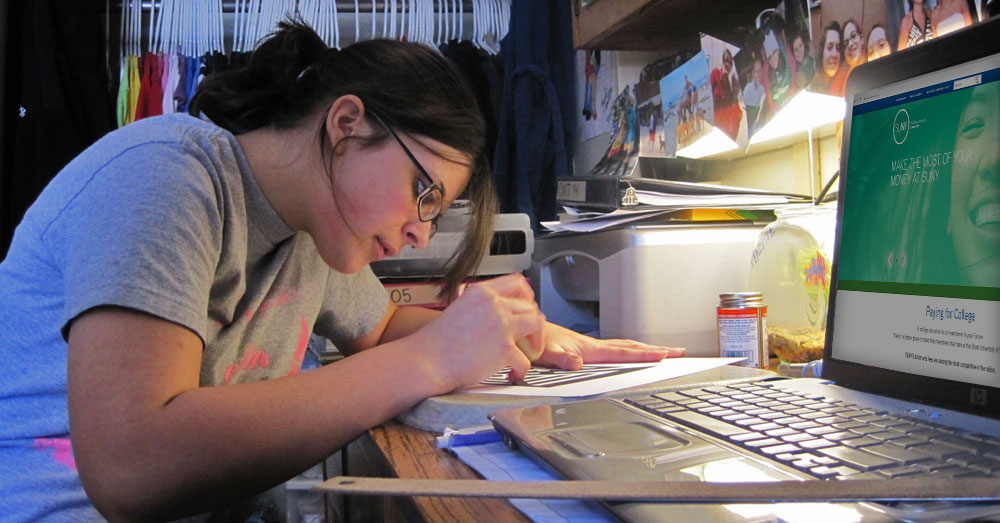A SUNY education is a high-quality, affordable option to earning a college degree. But if low tuition for New York State residents doesn’t fill all needs, a student can apply for many forms of federal, state, and private financial aid to make a college experience even more affordable. In fact, three out of four SUNY students use financial aid to help pay for college, and nearly 50% graduate with no federal student loan debt. Financial aid is available to all students regardless of economic status, and all students are encouraged to apply for the financial aid option(s) that could make a college education most affordable for them.
We’re here to help you learn how to get started with financial aid and how to pay for a college degree or certificate program. Let’s talk about the basics of financial aid at SUNY, such as:
- What is financial aid?
- What types of aid can you receive at a SUNY school?
- Who is eligible for financial aid?
- What the Excelsior Scholarship is and who is eligible for it?
What is financial aid?
Financial aid is money students receive to help pay for college. Financial aid can be used to learn a new trade, earn a degree, or go to graduate school. Financial aid is any funding that you or your family do not pay directly out of pocket or from a savings account.
The first place to start with receiving financial aid is the Free Application for Federal Student Aid, or FAFSA. This online form is the foundation of federal and state financial aid. Students must fill it out every year they attend.
What can I use financial aid for?
Financial aid is not just for paying for tuition. Students use financial aid to assist with the cost of attending college. Educational expenses covered by financial aid include tuition, fees, books, supplies, and living expenses.
Do SUNY schools give financial aid?
SUNY schools have many financial aid opportunities for students – grants, scholarships, tax credits, loans, and more. In addition to federal and New York State financial aid, many SUNY campuses offer institutional aid specific to each campus.
You will receive a personalized financial aid package from the campuses you’ve been accepted to after you’ve completed your FAFSA. You can estimate your college costs with SUNY’s net price calculator at suny.edu/smarttrack.
What are the types of financial aid?
There are two types of financial aid – aid that you have to pay back and aid that you don’t have to pay back. Grants and scholarships are common forms of financial aid that do not need to be paid back. Loans do need to be paid back. You may also be able to take advantage of student employment or federal work-study programs. Students typically use a combination of financial aid options to make college most affordable for them.
Visit suny.edu/smarttrack to learn more about financial aid, and feel free to reach out to the financial aid office at your SUNY campus of choice to discuss your options.
Who is eligible for the Excelsior scholarship?
The Excelsior Scholarship is open to New York State students who attend a SUNY or CUNY school. Families that earn less than $125,000 can apply for the scholarship. There are 5 things you should know about the Excelsior Scholarship:
- The scholarship covers remaining tuition expenses after all other funding sources are applied.
- Students must be enrolled in at least 12 credits per semester and complete 30 credits each academic year. Credits must be in your approved program of study. 15 credits per semester are recommended to avoid summer or winter study, which would not be covered by the Excelsior Scholarship.
- Students who received an Excelsior Scholarship while enrolled in a two-year program at a SUNY community college or technology college and wish to pursue a four-year degree must enroll in the four-year program in the next semester, without a break, to remain eligible for the scholarship.
- Applicants must live and/or work in New York for the number of years they receive the scholarship, or it turns into an interest-free loan that must be repaid. For example, if you received it for 4 years, you must live and/or work in the state for 4 years after graduation if you do not wish to repay it.
- Currently, students who are going back to college after starting college and then taking a break are not eligible to apply for the excelsior scholarship.
Can I go to SUNY for free?
SUNY, and your campus financial aid partners, work hard to make college as affordable as possible for you and your family. With grants and scholarships for those who are eligible, and some personal choices, students may reduce their total cost of attendance, making their college experience as rewarding as it could possibly be.





